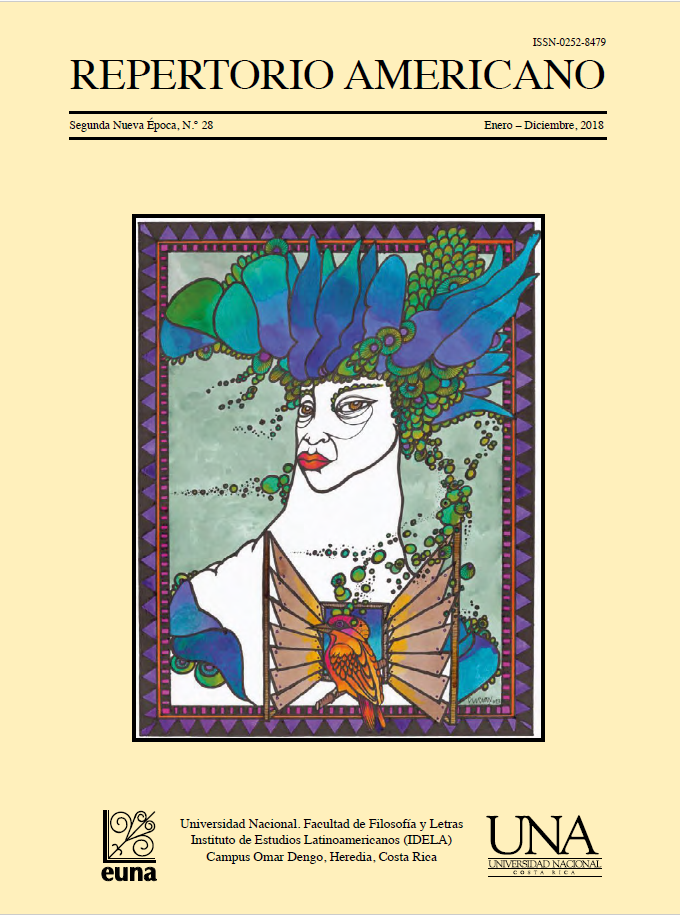Love, crisis processes, couple breakups and dis-love. Lines of reflection from the social approach based on Latin American music "plancha"
DOI:
https://doi.org/10.15359/ra.1-28.3Keywords:
love,, disenchantment, Latin American music, socializationAbstract
Romantic love is one of the most interesting and complex processes, both
socially and individually. Defining it in one way is even more complex.
However, we have all experienced it in one way or another. We find it in all
social spheres and in all stages of life, generating sensations that are possibly
unique and particular. Nobody knows how or at what moment love has
come to us, but we experience it, and we accumulate experiences that have
given us great satisfactions. But how do we fall in love? How did we learn to
differentiate what was love with respect to any other sensation or emotion?
This article is based on the premise that nobody has taught us to love, and our
social processes have allowed us to build fantasies and myths about falling in
love, which mark us in each of the romantic experiences of a couple, at such
a level that, When difficulties arise during the relationship, we do not know
how to resolve them, because we think that eternal love will be perfect. In
view of this, the objective of this article is to give continuity to the reflections
made in the article "Love, falling in love and the body" (2017), but focusing
on the processes of crisis, ruptures and dis-love that we all go through, taking
reference the Latin American music “plancha”.
References
Aguilera, A. (2000). Abrázame muy fuerte.
Abrázame muy fuerte [CD]. Estados
Unidos: RCA Récords.
Araujo, A. (1992). Evidencias. Silueta
[CD]. México: Sony Discos.
Bauman, Z. (2015). Amor líquido (7ma
ed.). México: Fondo de Cultura
Económica.
Bender, L. (productor) y Van Sant, G. (director)
(1997). Good will hunting (Película)
Estados Unidos: A Band Apart.
Cárdenas, I. y Ortiz, D. (2011). Entre el
amor y el odio. España: Editorial
Síntesis.
Castro, C. (2013). Vuélveme a querer. En
primera fila: día 1 [CD]. Estados
Unidos: Sony Music Latin.
Chaves, F. (2015). ¿Qué fue (y qué es)
la “plancha”? La Nación. Recuperado
com/revista-dominical/que-fuey-
que-es-la-plancha/DRFTQQG42RF3NJIBITT6ULMWQQ/
story/
De Vita, F. (1988). Te amo. Al norte del
sur [CD]. Venezuela y Estados Unidos:
CBS Discos.
De Vita, F. (2004). Si la ves. Stop [CD].
Estados Unidos: Sony Discos.
DiNovi, D., Lowry, H. (productores) y
Shankman, A. (director). (2002). A
walk to remenber (Película). Estados
Unidos: Di Novi Pictures.
Dúrcal, R. (1984). Costumbres. Canta a
Juan Gabriel Volumen 6 [CD]. España:
Ariola Eurodisc.
Figueroa, E. (1984). Y qué culpa tengo yo.
Chayanne es mi nombre [CD - Cassette].
España: RCA Ariola.
Fromm, E. (s. f.). El arte de amar. Recuperado
com/biblioteca/erich-fromm-el-arte-
de-amar.pdf
Huerta, J. y Huerta, J. (2015). Dueles. Un
besito más [CD]. México: Warner
Music.
Lagarde, M. (2000). Claves feministas para
la negociación del amor. Memoria de
Puntos de Encuentro. Managua, Nicaragua.
Recuperado de http://www.
caladona.org/grups/uploads/2013/04/
claves-feministaspara-el-poderio-yautonomia_
mlagarde.pdf
Montaner, R. (1999). Me va a extrañar. Con
la London Metropolitan Orchestra
[CD]. Venezuela: Warner Music.
Nazario, E. (1991). Lo que son las cosas. Lo
que son las cosas. [CD]. EMI Latin.
Ortiz, F. (2013). Amor y desamor (3era reimp.).
México: Editorial Taurus.
Ossana, D., Schamus, J. (productores) y
Lee, A. (director). (2005). Brokeback
mountain (Película). Estados
Unidos y Canadá: Good Machine.
Romo, D. (1986). Enamórate de mí. En
Mujer de todos, mujer de nadie
[CD]. México: EMI Music.
Rómulo, J. (1978). Lo pasado, pasado. Lo
pasado, pasado [CD]. México: Ariola
Récords.
Todd, J., Todd, S. (productores) y Nolan,
C. (director). (2000). Memento
(Película). Estados Unidos: Newmarket
Films Team Todd.
Valenzuela, Y. (1996). Me tienes que querer.
Más fuerte que la vida [CD].
México: Sony Internacional.
Vargas, C. (2017). El amor, enamoramiento
y el cuerpo: Líneas de reflexión
sobre el amor romántico presentes
en la música latinoamericana (salsa)
y la fotografía. Revista Repertorio
Americano, 27, pp. 61,84.
Downloads
Published
How to Cite
Issue
Section
License
Las cartas de entendimiento se facilitarán a las personas autoras al momento de aceptación de su trabajo para publicarse.
Todos los contenidos son de libre acceso con sólo citar la fuente.







